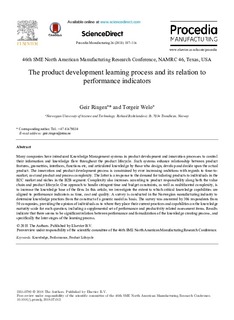The product development learning process and its relation to performance indicators
Journal article, Peer reviewed
Published version

View/
Date
2018Metadata
Show full item recordCollections
Abstract
Many companies have introduced Knowledge Management systems in product development and innovation processes to control their information and knowledge flow throughout the product lifecycle. Such systems enhance relationship between product features, geometries, interfaces, functions etc, and articulated knowledge by those who design, develop and decide upon the actual product. The innovation and product development process is constrained by ever increasing ambitions with regards to time-to-market, cost and product and process complexity. The latter is a response to the demand for tailoring products to individuals in the B2C market and niches in the B2B segment. Complexity also increases according to product responsibility along both the value chain and product lifecycle. One approach to handle stringent time and budget constraints, as well as multifaceted complexity, is to increase the knowledge base of the firm. In this article, we investigate the extent to which critical knowledge capabilities are aligned to performance indicators as time, cost and quality. A survey is conducted in the Norwegian manufacturing industry to determine knowledge practices from the construct of a generic model as basis. The survey was answered by 306 respondents from 50 companies, providing the opinion of individuals as to where they place their current practices and capabilities on the knowledge maturity scale for each question, including a supplemental set of performance and productivity related assessment items. Results indicate that there seems to be significant relation between performance and formalization of the knowledge creating process, and specifically the later stages of the learning process.
